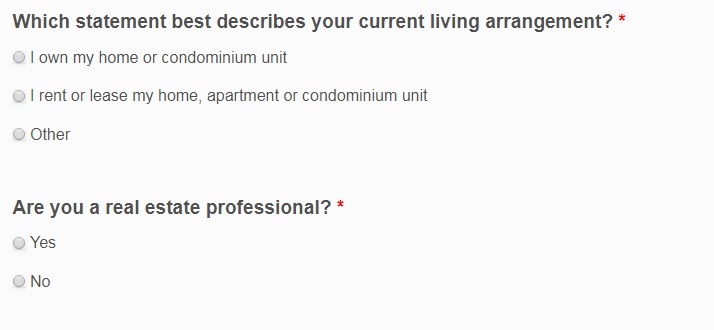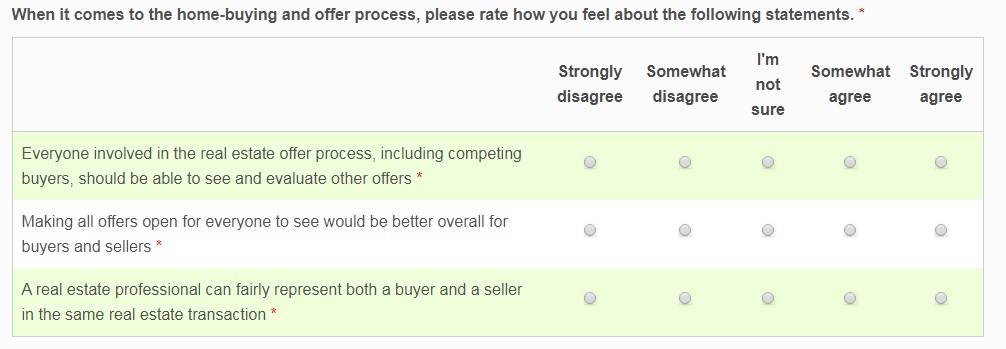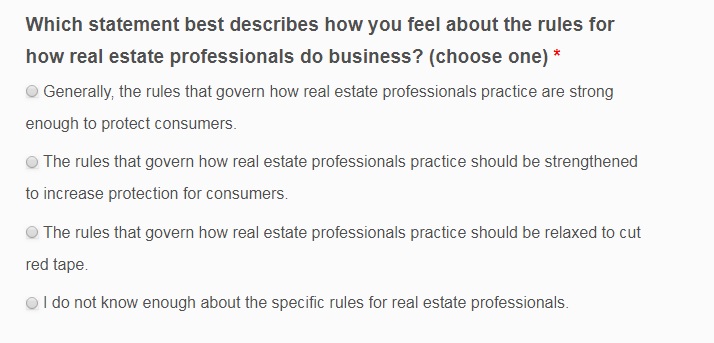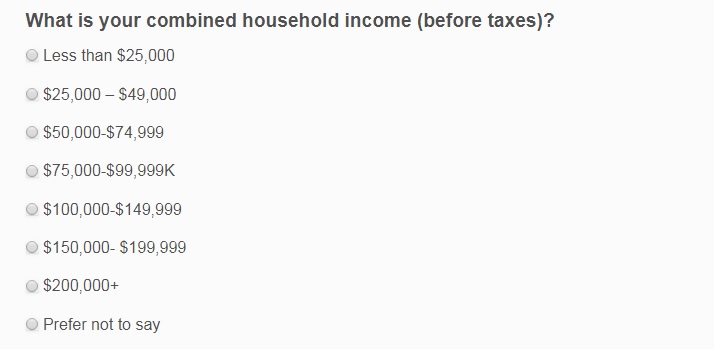What’s that famous line from The Godfather?
“Just when I thought I was out, they pull me back in.”
That’s how I feel sometimes when I complete a blog post, publish it, and then the comments and emails make me realize there’s more to the story.
One member of my team is always telling me, “Your ‘follow-up posts take the subject matter too far! Readers want variety! Come back to the topic next week, or next month.”
Fair point, but, like, um, have we met? I’m so obsessive-compulsive, and I like things done immediately. I can’t leave this for a week! I was the guy in university who did my dishes after I cooked dinner, but before I actually ate it.
One of the comments on Wednesday’s blog referred to a Toronto Star article from last month, and read, “I would be curious to get your thoughts on the idea of making it a buyer’s “right” to view competing offers.”
I had linked four articles to Wednesday’s blog about the proposed changes to REBBA and the corresponding added transparency, but I didn’t include this one as it was from January.
So here’s that article:
“Ontario Looks At Revamping The Rules Of The Real Estate Game”
Now to be fair, this article talks about more than just the suggestion that terms and conditions of competing offers should be allowed in multiple offer scenarios. It’s a round-up of many real estate practices currently being examined, including multiple representation and “double-ending,” as well as real estate discipline.
But as with the other articles from Wednesday’s blog post, the prevailing theme is disclosure and transparency in multiple offer situations.
As the reader commented on Wednesday’s blog, the very first sentence of the article offers up a whole other talking point
Should consumers have the right to see competing offers on the same property?
Wow, a right?
Really?
That’s a strong word; “right.”
I mean, my inner old-man wants to go off on a rant about how everything is a “right” in today’s entitlement society, but you’ve heard enough from me on that to last a lifetime.
There are certain rights that every man, woman, and child should enjoy, but when too many things become “rights,” then the word loses all meaning.
In the case of real estate buyers, should it really be a “right” to see competing offers? Are we at that point?
On Wednesday, we had talked about revamping REBBA to allow the seller the option of directing his or her agent to disclose the terms and conditions of other offers. But how many steps away is that from the buyer having the right?
Well, step one would be going from the seller having the option to making the disclosure mandatory.
Is that, it itself, giving the buyer the right?
Because if it is, then I would question whether buyers should have the right to keep the terms and conditions of their offer private. And then we’re right back where we started.
The right to keep an offer private, versus the right to see a competing offer.
Double-edged sword, catch-22, I’m not sure how to explain this.
There’s an element of NIMBY’ism here, or “do as I say, not as I do.”
The best of both words, perhaps.
A buyer doesn’t want other buyers to see his or her offer, but does want to see theirs.
How in the world do you balance those conflicting ideas?
And as for the exact verbiage, it opens the door to more questions. “Should consumers have the right to see competing offers on the same property?”
What is meant by “see,” exactly?
Be informed of some terms, or be informed of all terms?
Physically see the other offer?
Maybe put up a scoreboard at the listing brokerage with the price, deposit, closing, inclusions/exclusions, clauses, and conditions of each offer?
Or are we merely talking about price?
While I don’t think the buyer has a right to “see” competing offers on a property, or even the right to know all the terms and conditions, the government of Ontario wants to know if you think they should.
The Ontario.ca webstie currently has a survey running:
Survey: Modernizing The Rules For Ontario Real Estate Professionals
I encourage you all to click the link, and maybe even take the survey!
The deadline is March 15th.
I would love to be on the other end of the survey to see how they’re analyzing this data, because the very first questions are as follows:
So what does this mean, exactly?
Does it mean they are weighting the answers in the background? Or dividing the responses into categories?
If somebody clicks “yes” button to say they are a real estate agent, then their answers go in a different bucket?
If somebody rents, then they are more likely to hate on the real estate process?
If any of you work in polling, I’d love to hear how you think they use this data.
Now the crux of the survey itself can be found right in the middle of the page, and the first two questions have to do with disclosure and transparency in multiple offer situations, and the second question has to do with multiple representation:
Is it just me, or are the first two questions basically the same?
How would your answer differ in question #2 after answering question #1?
And is the survey affected (or in pollster langauge, is it tainted, skewed or altered) by including the third question along with the first two? The third question is a different topic from #1 and #2, and the presence of the word “fairly” makes it less likely for somebody to disagree with the first two questions.
The last question basically asks the public how much they hate real estate agents, which I think is totally fair:
I love how they throw the third option in there. Who the hell is going to pick that?
That’s essentially the end of the survey, but interestingly enough, there is another “qualifier” question, as I see it:
What’s the deal here?
Are we looking to see how the rich and poor answer these questions differently? Again, if anybody works in polling, I’d love to know.
This survey by Ontario.ca is obviously confidential, but I would love to know how the public respond, and of course, I’d love to know how they respond according to the qualifiers that the survey includes, such as ownership rate, household income, experience levels, etc.
I think we could accurately jump to some conclusions, such as those who haven’t bought any properties, or have bought one, being more likely to answer that “competing offers should be disclosed” than somebody who has bought/sold over 5 times, as per the survey.
There was a lot of discussion on this subject after Wednesday’s blog, but as a follow-up, I would love to know how you guys would answer this survey.
Yes, it’s supposed to be confidential.
But where’s the fun in that?
For the record, my responses:
“Everyone involved in the real estate process, including competing buyers, should be able to see and evaluate other offers.” STRONGLY DISAGREE.
Define “everyone.”
Define “see.”
Define “evaluate.”
Put a time, place, and method to “see” and “evaluate,” because this is far too aloof. Who is “everyone” anyways? And how does this take place?
“Making all offers open for everybody to see would be better overall for buyers and sellers.” STRONGLY DISAGREE.
You can’t answer anything but “strongly disagree,” because to suggest that sellers would be better off would entirely incorrect.
A real estate professional can fairly represent both a buyer and a seller in a real estate transaction. I’M NOT SURE.
I’m not sure because I would need to know which real estate professional this was, and who the buyer and seller were, and the property, and the situation, and all the facts.
It’s not possible, in theory.
But in practice it can be.
And Ontario can never do away with multiple representation, because it would severely handicap sellers outside of any hot market. God forbid a seller in rural Ontario had an interested buyer after six months, only to find out that the interested buyer was represented by the same agent who was listing the seller’s home, and thus the agent had to take that buyer elsewhere.
As for the last question, I would select the answer:
The rules that govern how real estate professionals practice should be strengthened to increase protection for consumers.
I can’t see any other answer, in this case.
The real estate industry lacks regulation in many areas where regulation is severely needed, and I for one am open to change.
As I said, I welcome your answers to the above questions as well.




































Graham
at 9:07 am
Godfather 3, a flawed masterpiece? Yes or No?
David Fleming
at 10:09 am
@ Graham
1972, 1974, and……1990? You just can’t reignite that flame after 16 years. Although having said that, shows like Will & Grace and Murphy Brown are back, so maybe things have changed.
The movie had far too many cliches for me. First, the idea of Michael living this empty life filled with remorse, guilt, and now wanting to somehow make up for it by being a good guy, giving money away? That’s not what the original fans of The Godfather wanted to see. It felt like the writers teaching kids a happy ending – especially when Michael dies alone at the end of the movie. Second, Michael’s daughter getting killed by mistake happens in every damn movie, especially those with Mel Gibson or Liam Neeson. She dies in his arms, he screams aloud. Meh. it’s been done way too many times.
This movie probably never should have been made, but how do you turn down the money?
Graham
at 10:18 am
They made him an offer he couldn’t refuse:
https://www.youtube.com/watch?v=UhnsHvz7UL8
daniel b
at 3:08 pm
My problem is the script and the acting. Andy Garcia is terrible. Sofia Coppola is terrible. And the dialogue is so bad even Pacino sucks in it.
Mxyzptlk
at 3:28 pm
As opposed to all those other films in which Andy Garcia is not terrible, such as … um … there’s gotta be one, let’s see … um …
Paully
at 9:34 am
That kind of ongoing commitment to the dishes and similar domestic chores should yield you a long and happy marriage!
Derek
at 10:36 am
I think it is a bit of a “red herring” to get mixed up in the terminology of any “right” to see competing offers. I mean, there are “rights” and there are “rights”. Am I right? There are a lot of regulations governing a lot of interactions that do not rise to some moral precipice of protecting a “right”.
What are the arguments against transparency?
The seller doesn’t win? Well, does the seller lose? How?
It would still be a ‘bidding war’. I don’t think the problem is “bidding wars”. It’s transparency. Two different things.
The end result would be the same? Then how is transparency a problem? How is it worse for the seller.
It would be really hard? It’s 2019! Put some money into a platform and get it out there.
But the seller’s “consent” is absolutely necessary? Why is that again? Other purchasers knowing we took no conditions over an extra 20k gives us the vapours?
But some buyers won’t want to compete in transparency? Get over it.
The Tuesday night drive-in-movie offer exchange is sacred? I doubt it.
It’s not a ‘right’? It does not have to be equivalent to a “right” to be right.
What are other reasons to argue against transparency?
Appraiser
at 11:20 am
Please provide your alternative / better method of presenting multiple offers.
Simply repeating the word transparency doesn’t cut it. I see nothing wrong with the current system, especially as a potential seller.
The recent proliferation of multiple offers in the GTA brought this issue to a head, mainly due to complaints from those who lost out on those multiple offers. When almost every property is receiving multiples, there’s bound to be a lot of sour grapes, not to mention the resultant conspiracy theories about nefarious real estate agents.
Derek
at 11:40 am
I don’t disagree with you. Let’s face it, any problem with multiple offers, real or perceived, is unique to only some markets. And if you say it is only a recent phenomenon, I believe you. Is it even a “problem” in a down market which could occur in our lifetimes? I still don’t see any stated reason that transparency is a negative thing. I appreciate that you don’t see anything wrong with the current system, but what would be wrong with transparency? There is certainly the potential for wrong in an opaque practice even if you’ve never seen it. To your first point, I have no delusions that I am the person to design a transparent process going forward, but surely in 2019, there exists the means to formally communicate to all interested parties some key terms of competing offers. At an office, or in the ether. I don’t believe that the current practice developed because transparency is impossible or bad. I acknowledge that the fact that I cannot provide a regulation ready solution means that I am completely wrong and should be dismissed in the minds of some people.
Joel
at 11:58 am
There was an article and video that David covered last year about agents double ending deals and telling the buyers what to do. I think it was done by the CBC and the had video recordings.
I say this as it is not a ‘conspiracy theory’ about nefarious agents. It is proven and David talks about it often in this blog and has for years.
If you like the current way that is fine, but don’t act as if everything negative about realtors and the way many operate is made up, that is disingenuous.
Appraiser
at 1:08 pm
Fair point. I would like to point out though that those who break existing rules are the same ones who will find a way to break any new rules too, same as any profession. They need to be weeded out.
Jennifer
at 1:10 pm
Even people who “win” may have issues because they may have overpaid (see articles on people who can’t get financing due to having overpaid). Complaints abound all around. The only winner is the seller and the agents. It’s an unfair process, period.
Appraiser
at 2:35 pm
Help me to understand. If they can’t get financing, the deal doesn’t close, in which case neither the seller nor the realtors get paid. Perhaps you could link to one of the articles you refer to for context.
m m
at 11:03 am
That survey is a joke. Instead of public consultations, which the current provincial government is deathly afraid of, they offer an online survey, and then they can claim that “the people have spoken”. Anyone can sway the results by hiring cheap bots.
Mxyzptlk
at 3:29 pm
Yes, the self-proclaimed Man of the People. What a (sick) joke.
Joel
at 12:05 pm
Since the numbers involved in real estate are huge I think it would be reasonable for the public to expect the same scrutiny and consumer protection that they get when making/buying an investment.
The prospectus on a $100K investment is much more detailed than someone buying a $500K investment condo or a $1 million home, in which they are planning to use as retirement fund when they retire. (Tax free)
The more bad/unethical agents that get weeded out the better and the honest agents will get more deals and be more efficient in the long run. Consumers win and the good agents win.
Everyone wants a honest chance and level playing field when making the biggest purchase of their life which will likely be the biggest investment of their life.
Derek
at 12:12 pm
But, since sellers may not get as much in a transparent process (assume this is true), shouldn’t the current system remain? Shouldn’t the real estate market’s transaction process be premised upon what is best (assume it is best now) for the seller?
Joel
at 3:16 pm
I have less concern with how the process is done (no problem with the current), but more a problem that agents could lie to other buyers/agents and can give the information to their clients.
Perhaps if an agent has an offer on a property they are selling, then there is full open transparency. In these cases the seller would have to decide if the agent could represent both sides.
Derek
at 12:40 pm
Here’s a thought. I imagine that hardworking and skilled agents such as our host here have a (very significant ) competitive advantage operating under the current general practice for multiple offer situations. All other things being equal, you use someone like our host and you have automatically increased your chances of ‘winning’ the bid and being happy with your deal. You have all the info and data, you’re prepared for the expected and unexpected, you have concrete and proper advice on value/quantum, you have a coherent strategy and he’s going to deal with the other side like a pro. Go get ’em!
But, in a transparent multiple offer situation, is the value of a quality agent reduced? Negated? Is your agent’s secret sauce irrelevant when transparency is the foundation for the process?
Jennifer
at 1:18 pm
“It’s not possible, in theory.
But in practice it can be.”
This is absolutely not true. They cannot fairly represent both. An agent representing both sides is in a conflict of interest, period. Actual, perceived or potential – it’s all there. The aims of the buyer and seller are different. Whether people want to accept that conflict is another story.
To answer your question, I’m one for full transparency and no double-ending unless in exceptional circumstances and/or all parties that are involved (all bidders, sellers) agree.
John
at 7:51 am
If it was a an open auction, and all the real estate transaction information is available to the public, there is no need to have buyer representation (or seller representation). The role of the real estate agent then is to simply perform the process of getting the house sold.
Unless you have a good agent, buyer representation simply isn’t there. I was a first time home buyer myself. What my agent did was simply coerce me to give in to the selling agent’s demands. Granted, at that time the market was red hot.
Full transparency may potentially not in the favour of the seller, but that is due to the total lack of transparency today, where agents can simply lie and get their house sold. If there really is a lot of interest in the house and a bidding war is expected, full transparency is not going to prevent it. An open auction in my view is the fairest way to go. It may even sell for higher than today’s system.
Appraiser
at 9:29 am
Coerce: https://en.oxforddictionaries.com/definition/coerce
“Persuade (an unwilling person) to do something by using force or threat.”
So you were forced to sign that deal in a red hot market, and bear no personal responsibility?
Chris
at 12:05 pm
Definition of coerce
1 : to compel to an act or choice
https://www.merriam-webster.com/dictionary/coerce
At no point in his comment does John absolve himself of all personal responsibility. That’s a straw man argument that you have fabricated, appraiser.
What he clearly said was that as a buyer, his agent provided him with little service, beyond pressuring him to accept the seller’s demands, thereby closing the deal and ensuring a commission.
As I’ve said before, it’s a misalignment of incentives. Agents are rewarded through transactions being completed, not for securing the best outcome for their client. Not all agents will act like this, but their compensation is structured in such a way as to encourage it.
Appraiser
at 8:12 am
Who’s asking you?
Chris
at 10:12 am
Same one who asked you to address John’s reply to Jennifer.
Dan Dickinson
at 8:22 pm
I’ve always been intrigued by the Australian model. Everyone stands on the sidewalk in front of the house and bids, auction style, in real time. Canadian winters would add an interesting dimension. 🙂
Hayden
at 7:26 am
who walks us through a story whether that story be in an audio book whether it be in a movie whether it be in a segment of a television show a documentary the purpose is to take us on a journey and that journey is